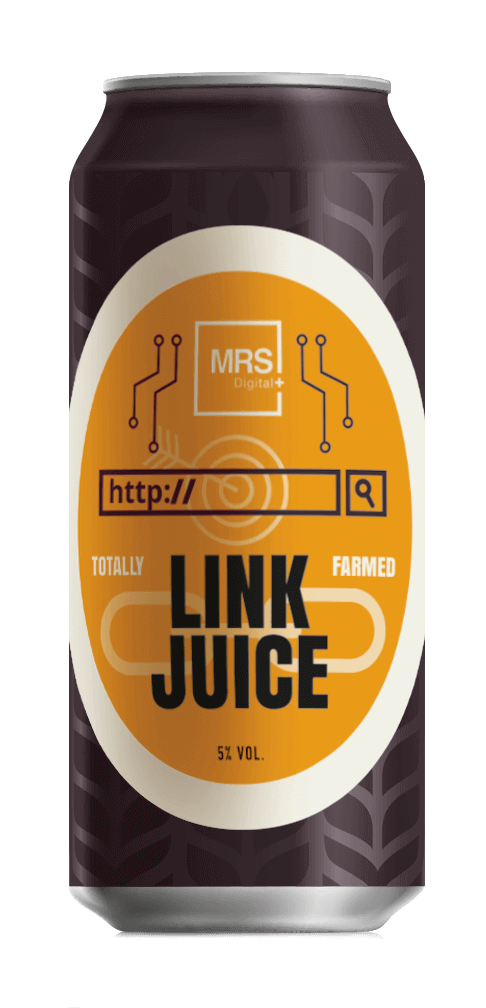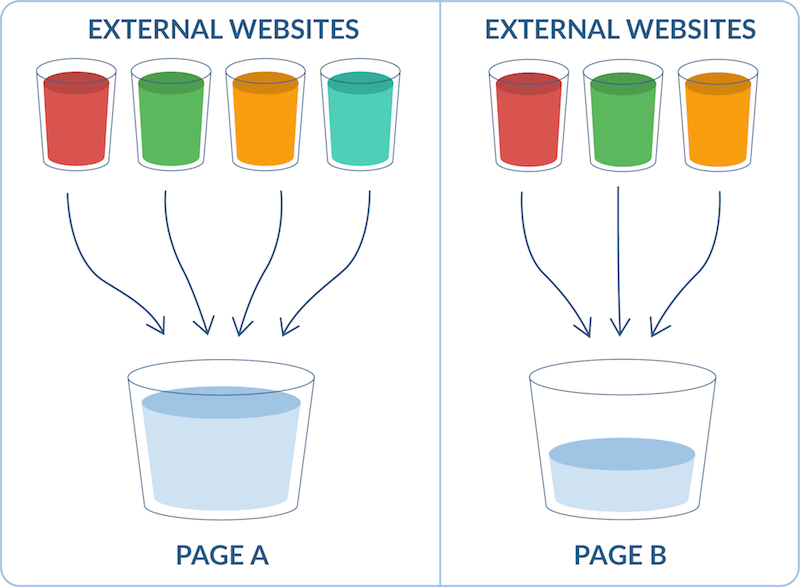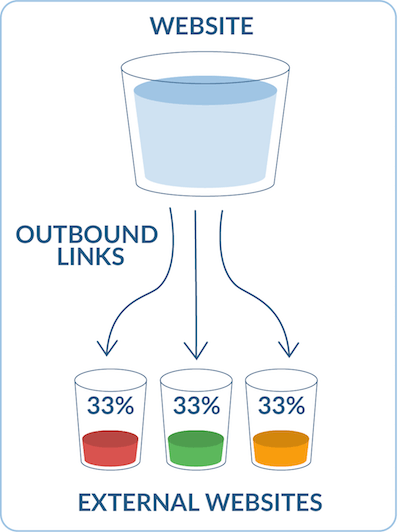
Anyone familiar with Search Engine Optimization (SEO) has heard of link juice. It’s an informal name for what’s actually a formal–and rather formidable–aspect of SEO. Link juice has to do with links. More specifically, it’s the amount of authority your website gains when one website passes some of its established authority (or power) to your site. Somehow, your site has earned a nod from another in the form of a backlink. As a result, some of their link juice passes to you, and you’ll see your rankings rise. And, of course, visitors will choose to click the link and visit your site as well.
Link juice applies to internal links within your own site as well. In this case, it’s a link from a page to a page rather than from site to site (more on this later).
Building such authority is more formally called link equity, and it’s a big deal when it comes to SEO strategy. More specifically, link equity is a search engine ranking factor rooted in the concept that quality links pass authority and value from one page to another. Earning backlinks from sites with equal or higher authority and relevance on a topic will generate more link juice and help your page rank higher in Search Engine Results Pages (SERPs). Of course, the more link juice (link equity) your site’s page has, the better its chances of ranking higher for its target keywords. While page rank is undoubtedly a goal for building link juice, it’s not synonymous with page rank. Rather, it’s the value established by how your page’s rank is transferred through each backlink.
Increasing your link juice takes focused effort and diverse strategies. Strong backlinks are only one component. Let’s break it down.
Determining Link Equity
Theoretically, the website authority of the site linking out is spread more or less equally to the various pages it links to. More realistically, though, the process is influenced by several other elements, making it rather complex to explain, let alone harness. To follow the analogy of the name “link juice,” there is a “flow” to it that differs from page to page and website to website. Thus, the amount of “juice” each link passes depends on the authority of the hosting website. If theirs is an authoritative page with other quality sites linking to it, then any backlink you earn there will have stronger link juice than on a site with lesser authority or link equity of its own. And remember that more link juice means more visitors to your page and higher SERPs results.

Some additional elements that affect the link juice of your backlinks include page placement, anchor text, context, relevance, website authority, HTML attributes, and the number of links.
Page Placement
A website’s architecture helps Google determine what content is useful to visitors. Therefore, links added to the footer understandably are far less valuable than links strategically placed within the content. Adding links to a footer is another way to compromise relevance, not to mention making the link appear to be an afterthought rather than a vote of confidence for the page it’s linking to.
Anchor Text
Anchor text tells Google what the destination page is about. Though, there are rules on anchor text dictated by Google to prevent SEO manipulation of search algorithms. Such manipulation tactics include:
- Stuffing keywords into the anchor text
- Using extremely long anchor text
- Using keywords that are not relevant to the link’s destination
As black hat SEO practitioners try these and other ways to fool the algorithm, Google rolls out updates to prevent these unethical tactics from increasing SERP rankings. This is why it’s essential to follow best practices.
If there are too many keywords stuffed into the anchor text, it hinders the flow of link juice. Keyword stuffing is not an intelligent practice, and Google may penalize the site for it. On the other hand, not enough keywords mean the link passes through but with less value due to lack of relevance.
Good anchor text for backlinks is naturally placed and relative to the content on the page as well as the link page. It’s short but clearly adds value to the user by providing the link.
Website Authority
Has the linking site established authority? Trusted sites have built up their authority, so their links pass more link equity than links from brand-new sites just starting out. Likewise, they tend to have other sites linking them that also have established authority, strengthening the link juice all the more.
Context and Topic Relevance
Link equity relies heavily upon the context in which the backlink is given. The link juice is considerably devalued if the link is irrelevant or even entirely off-context for the site or the page it’s on. For example, let’s say a photography site features a link to a cooking site for some reason. Google will likely recognize this and not assign much authority or value to the site or to the backlink itself.
Website Authority AND Relevance
Naturally, website authority and topic relevance go hand in hand. Even if your site and the site with your backlink are not in the same niche, there should be some connection that establishes their endorsement of your page. The topic of the website’s page linking to your content must be related to your page’s topic.
One way to include natural backlinks that carry link juice is resource pages. Resources are relative links by design because they are pages designed for users to learn more about a topic in the site’s content. SEOs favor natural links on a resource page. However, note that the links placed on a resources page should be helpful. Otherwise, they won’t pass along the link juice as intended.
Websites with concentrated link juice power are in good standing and are considered trustworthy. Thus, they pass link juice as long as the link is relevant to the content on the page.
There are actually some SEO tools that calculate authority in some manner. These include Ahrefs Domain Rating, Moz DA, and Majestic Trustflow. All these calculate scores to determine which pages are in good standing and which are not. As an easy example, if Forbes or Time Magazine links to your website, you’ll have some rich link juice flowing your way.
Now, websites with less authority can still pass link juice if they are relative to a specific industry. They may not rank on any of the tools listed above, though they are authoritative within the particular niche and still pass authoritative link juice. In fact, they often pass more link juice than the more established, high-authority sites.
For instance, an article on the best small pet specialty veterinarians in Oakdale, New Hampshire, gets backlinks from several small practices in that area. They get even more from local pet supply stores and dog parks, who all link to that article on their websites. That article will earn link juice, even though the local websites are not formally considered authoritative. So, don’t overlook the little guy in this case.
Additional HTML Attributes
HTML rel attributes like rel=”nofollow, UGC, sponsored” devalue links. Why? Because no follow links are those often left in visitor comments. No-followed links are ignored by crawlers and can’t pass any value. If the site doesn’t endorse the backlink, they add the no follow tag, so anyone who clicks on it won’t be taken to the page.
The UGC tag means User-Generated Content (meaning not placed there by the site’s administrator). Finally, the Sponsored tag means the link was paid for rather than voluntarily endorsed.
The Number of Links
Simply put, if your link is lost among many others on a page, users will have difficulty finding it, if they find it at all. For example, backlinks that are part of link list pages do not pass any significant value, and for obvious reasons. A legitimately placed link will be found logically within the context. If other links appear with it, they will also be related to that content, and not so many in number that it detracts from their value or usefulness to the reader. While there’s no definite rule about how many links you should place on a page, visitors (and Google) tend to know when too much is too much.
How to Build Link Equity with Keywords
Keywords are essential elements within any optimization strategy. They are, after all, a cornerstone of SEO. You’ve likely already done extensive work analyzing, researching, and incorporating keywords into your website. Now that they are there, why not also use them for link-building?
So, when creating your links, include them in sentences containing your keywords where possible. The catch is to remember that the content on the linked page should be relevant to that keyword.
How to Amplify Link Juice with Internal Links
As mentioned previously, link equity depends on factors like the linking page’s authority, placement on the page, topical relevance, and HTML rel attributes. Up until now, we have been talking about backlinks. Internal links within your own site are also a meaningful way to build link equity. Let’s discuss that now.
First, understand that internal links are necessary from an SEO perspective because Google spiders crawl sites, and they need internal links to do so. Spiders can’t access and index pages because they don’t have internal links. Further, isolated links aren’t recognized by Google’s spiders, so those internal links are needed.
So, if you have a page that’s ranking well, you can spread your own link juice by internally linking to other pages that you’d like to grow in value. The most effective internal linking strategies include adding internal links:
- As a source
- As a “view next”
- In the body of the text
- In the page
- In the navigation
- In the sidebar
Directing readers to “view next” or “read more” about a topic on a high-performing page is a great way to lead more people to that page. These links appear naturally in the body of your web page content. If applicable, you can also include a link to the page within the site’s navigation and sidebar to give it more visibility.
Here are some additional ways to take advantage of internal linking:
Spread Internal Links Evenly
Your pages should not simply point back to your home page. That would send all your internal link juice to the home page. Rather, your pages should be interwoven so that your visitors can follow a logical path through your site should they choose to. Also, there should never be dead ends on a page where the only option they have is to backtrack or click the home button. There should always be an option to continue to another page(s).
For example, if your user finds their way to a specific product page, include a list of links to pages in similar categories.
Be Selective with Your Internal Links
While it’s best practice to spread your link juice evenly throughout your site, it’s also essential to consider which pages are worth boosting. For example, the Contact Us page isn’t worth boosting because you likely have it linked in the top navigation. Instead, you may have another place in mind that lists your cornerstone service or product.

Be Natural and Relevant
When choosing which pages to link to, be practical in your selection. The link and the content in which it is embedded should be appropriate to the subject of the link. This increases the likelihood that visitors will click your link. This sends solid messages to search engines as well.
Create Quality Content
Another cornerstone of SEO is quality content. You hear this term so often because it fortifies almost every aspect of SEO strategy. Link juice is no exception. After all, none of the tactics and tools will help you gain rank if your content is lackluster. Your content should be relevant (there’s that word again), original, useful, and deliver what it promises.
If your content adheres to these characteristics, and your site has good structure and navigation, your site should be evaluated well by Google’s algorithms. More importantly, visitors will visit your site, share links, engage in a good user experience, and grow your authority, which is where the link juice will start flowing.
Digital Marketing Strategies for Link Equity
As you can see, the funny name actually explains a sophisticated concept. Link juice or link equity is an SEO feature that touches on several well-known tenets of quality content, site architecture and navigation, link building, SERPS, website authority, content relevance, and keywords.
Strengthening your site’s link juice can pose quite a challenge in today’s competitive world of ranking higher than the competition and satisfying the Google algorithm gods. Consider professional digital marketing services if you’ve done all you can to maximize your SEO but still wish to drive more traffic and enhance your link equity. At Searched & Found, we don’t use the term link juice loosely and include link equity in our SEO services.